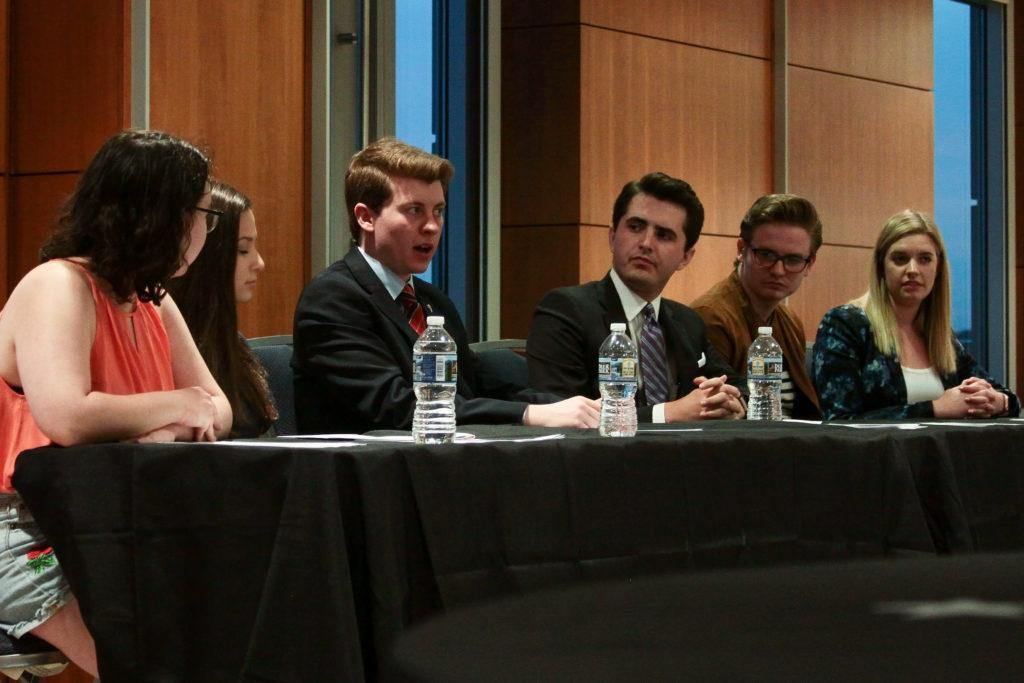Five student organizations came together Tuesday night to discuss how to have political conversations on campus in a highly-polarized climate.
The event, called the “Bipartisan Discussion Summit,” was the first of its kind organized by GW’s chapter of No Labels, a national organization that tries to solve political dysfunction in the United States and promote ideological independence.
The other student organizations in attendance — GW College Democrats, GW College Republicans, Young Americans for Liberty and the Roosevelt Institute — came from across the political spectrum to discuss topics like how a party in power should work with the minority party to solve political problems.
“The thought was to get five of the largest political groups together for a discussion instead of a debate,” No Labels GW President Steven Kelly said at the event. “It felt like a more natural way to look at the issues. We’d love to really develop a culture of conversation at GW.”
The event began with smaller discussions at eight individual tables and ended with a panel featuring one representative from each of the student organizations in attendance.
Here are some of the highlights from the event:
1. The role of filibustering
The table discussions centered on the impact of a minority party obstructing political progress, like filibustering political nominees or shutting down the federal government over budget concerns.
“I think filibustering hinders rather than helps the process because you need to be able to fill those positions. Having those positions unfilled is not necessarily in the best interest of anybody,” Nora Hennessey, a member of the Roosevelt Institute, said about the recent effort Democratic effort to block Supreme Court nominee Neil Gorsuch.
College Democrats President Jazmin Kay said courts have become much more politicized in recent years, impacting how they are able to make decisions.
“I think at the root of the issue is whether or not we can make judicial decisions without having biases,” she said. “Does the court always have to be politicized? How did we get here where our lawmaking process is inherently so political?”
2. Communicating between parties
The panel discussion focused on the continuous divide between the two major parties that panelists said has made it more difficult for the political system to function.
“There is a lot of miscommunication between the majority and minority party, Marisa Mantovani, a member of No Labels GW, said. “People are promoted to be divisive and not work with the majority or minority party.”
Barrett Young, a member of the conservative group Young Americans for Liberty, said the minority party often tries to represent its own members fundamentally different political beliefs, causing a partisan divide.
“We have to understand the role of government and democracy, but people were elected to represent their constituency throughout the entire country,” he said. “It’s in their job title, they’re representatives. They have a duty both morally and by oath of office to represent their constituents.”
3. Beyond the discussion
Some event attendees said more there should be a bigger effort to create a healthy political discussion across party lines. Young said moral arguments over hot button social issues often prevent political leaders from developing constructive solutions.
“It’s much more productive to talk about what the result of the filibuster is going to be, not the moral questions that Democrats or Republicans will never agree on,” he said.
T.J. Clark, who represented the College Democrats on the panel, said more could be done to improve the relationship between the parties.
“There’s so much more we can be doing other than starting a conversation,” he said. “We’re supposed to be having a conversation up here about what we can do to bring people of different ideologies to just talk, but we can do so much more by finding a way to come to an agreement. Otherwise we’re going to fall into the same issues that the people on the Hill have just a mile away from us.”
This discussion was one of many that No Labels GW hopes to hold in the future, Kelly, the group’s president, said.
“Tonight was a strong start to a complex discussion,” he said in an email. “We look forward to continuing this conversation and working to build trust, respect and mutual understanding within the GW community.”





